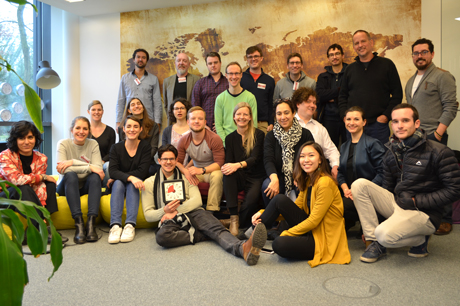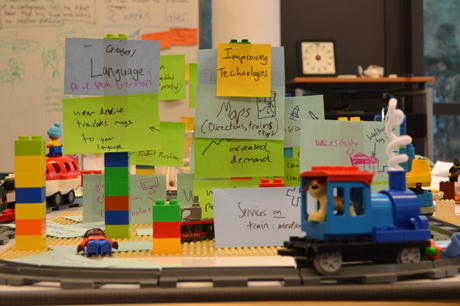The world of transport is undergoing a digital revolution. As mobility centers, train stations especially provide a key space for the implementation of innovative services. But which services do customers expect from train stations in times of digitalization? How will the interaction between customers and the station service team develop? 71 students from 15 countries tackled these questions during the Global Design Thinking Week (GDTW) at the HPI School of Design Thinking.
Every day around 17 million passengers use train stations in Germany. In the past years, they have become more than just mobility hubs. Extensive investment has turned them into shopping and service centers that are strongly affected by the digitalization. This development results both in new customer needs as well as in new requirements for service staff. Which services and processes do service control centers need to manage at the train station of the future? What kind of information systems do the customers want?
During the GDTW 2018, ten international and multidisciplinary student teams explored how service, security, and cleanliness need to be designed at the train station of the future. According to the motto “From inspiration to ideas”, they developed innovative and human-centered ideas for service and security processes at train stations. The teams presented their challenges, approaches and prototypes in short presentations and at the GDTW trade show for which they created their own booths in the HPI D-School.
Self-driving cars, augmented reality and artificial intelligence will play a major role
Ten teams developed solutions which can be implemented in the near future. The ideas ranges from interactive touchscreens, which give information about departure times and shopping possibilities, through a digital direction system to temporary pop-up trucks, which offer weather protection and seating facilities on smaller train stations without waiting room, in emergency situations or for large events.
In addition, three further teams, the so called „future teams“, gave an outlook into the far future and developed a vision of travelling in the year 2033. Especially self-driving cars, augmented reality and artificial intelligence play a major role in these scenarios. Thus, for example, a self-driving trolley with an intelligent voice assistant should help elderly people to find their platform. Another idea shows how augmented reality lenses guide travelers through the train station and offer additional information about shops and time schedule.
Withing the Coaches Exchange Program (CEP), coaches from Genovasi (Malaysia), Openlab (Sweden) and the AUC (Egypt) took part at the GDTW 2018. The CEP allows at a cross-cultural exchange about programs and experiences between Design Thinking coaches and program leads to develop and further enhance coaching practices in academic and professional settings.
Die Global Design Thinking Week
Following the motto „From inspiration to ideas“, students focus on empathy and explore latent user needs, requirements and wishes. As a start, potential fields of opportunity are identified and described from a user perspective. Designing and testing new ideas and solutions through prototyping and iterating are also addressed.
During one week with five working days, our students get to know the key competencies for working in innovative and creative environments. The problem statement, our so-called “Challenge” is posed by an external project partner and is approached together, just like during the semester program at HPI School of Design Thinking. Partner of the GDTW 2018 is the DB Station&Service AG.


